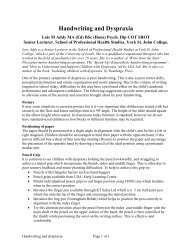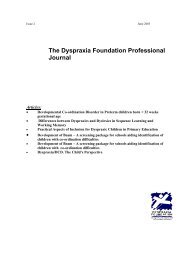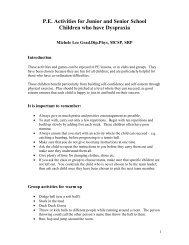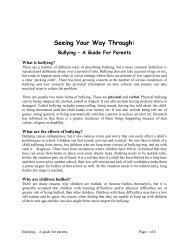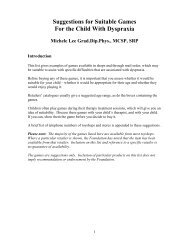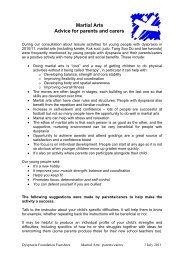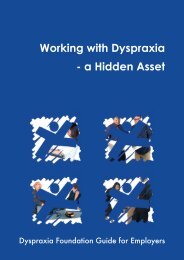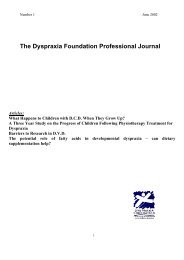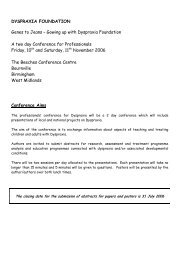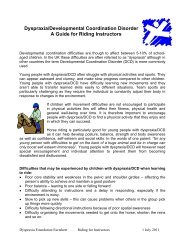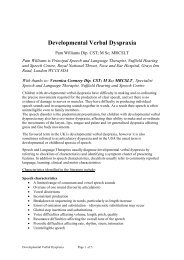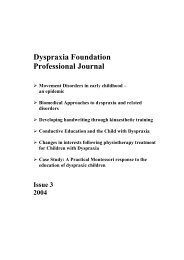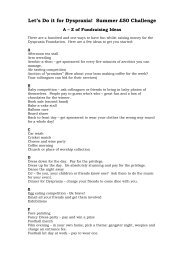Developmental Verbal Dyspraxia - Dyspraxia Foundation
Developmental Verbal Dyspraxia - Dyspraxia Foundation
Developmental Verbal Dyspraxia - Dyspraxia Foundation
Create successful ePaper yourself
Turn your PDF publications into a flip-book with our unique Google optimized e-Paper software.
Co-occurring characteristics• Family history of speech, language or literacy difficulties• Delayed language development – expressive usually more affected than receptive• Delayed development of early speech skills e.g. babbling• Feeding difficulties• Oral dyspraxia affecting movements of the larynx, lips, tongue or palate• Generalised developmental dyspraxia affecting fine and /or gross motor co-ordinationLiteracy difficulties affecting reading, spelling and writing• Slow progress in therapy• Literacy difficulties under co-occurring characteristics<strong>Developmental</strong> verbal dyspraxia has been described as an unfolding and changing condition.The range of problems experienced "unfold" as the child progresses and more demands areplaced on him. As a result, the presentation of a child with developmental verbal dyspraxia isdifferent according to age and stage of development. Unfortunately, this complicatesdiagnosis.Help for children with developmental verbal dyspraxiaChildren with speech difficulties should be referred to a Speech and Language Therapist asearly as possible. This can be arranged through a GP or Health Visitor or directly bycontacting your local clinic or health centre.The Speech and Language Therapist will be able to assess your child, identify the presentingdifficulties and advise on management.Your Speech and Language Therapist will be able to advise whether a label of developmentalverbal dyspraxia is appropriate to describe your child's speech difficulties or whether anotherdescriptor is more appropriate. Diagnosis of developmental verbal dyspraxia is complex andoften becomes clearer over time.Your therapist may also prefer to describe your child's difficulties rather than assign a labeleg "Tom has a severe speech disorder, characterised by typical dyspraxic features, rather than"Tom has developmental verbal dyspraxia". This is accepted practice within the speech andlanguage therapy profession.It is generally recognised that children with developmental verbal dyspraxia do not get betterwithout help. Usually they require regular, direct therapy delivered by a Speech andLanguage Therapist, supported by frequent practise outside the therapy sessions e.g. at homeand /or in school.Speech and Language Therapists use different therapy approaches to treat children withdevelopmental verbal dyspraxia. One popular approach is The Nuffield <strong>Dyspraxia</strong>Programme (1985; 1992; 2004). It is one of the only published therapy approachesspecifically for developmental verbal dyspraxia and is used widely by Speech and LanguageTherapists in the UK and overseas. It offers a systematic approach to the assessment andtreatment of developmental verbal dyspraxia and is particularly suitable for children aged 3-7years.In the early stages of the Nuffield <strong>Dyspraxia</strong> Programme, basic oro-motor exercises areadvised to help the child develop accurate and rapid movements of all areas of the speechapparatus in preparation for co-ordinating these movements in the production of speechsounds. If you are waiting to see a Speech and Language Therapist or want to start doingsomething helpful with your child, these oromotor exercises, written by Veronica Connery,Specialist Speech and Language Therapist provide a good starting point:<strong>Developmental</strong> <strong>Verbal</strong> <strong>Dyspraxia</strong> Page 2 of 5



